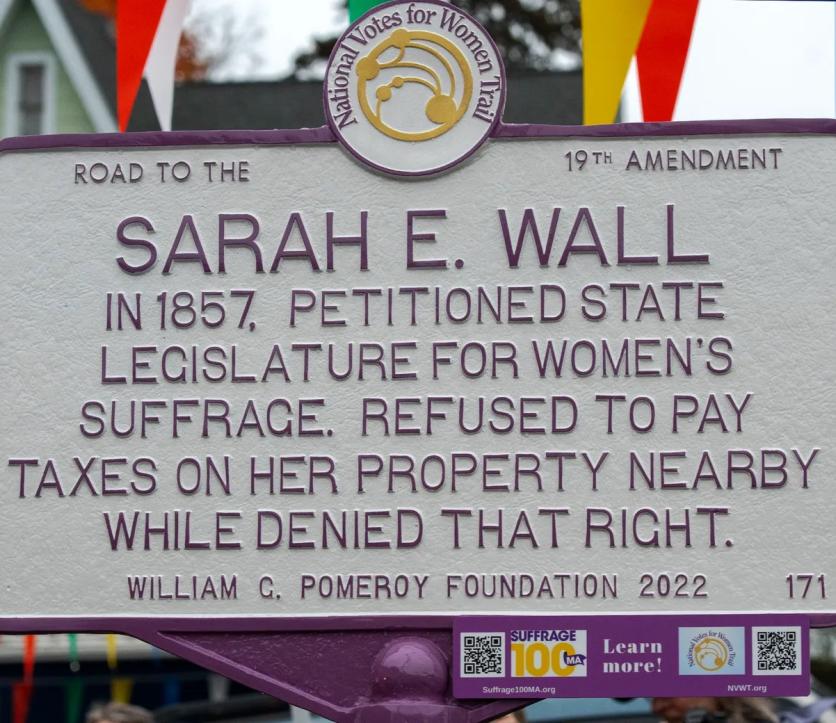Abolitionist, Women’s Rights Activist, Suffragist
By Katie Woods, Digital Public Historian
An ardent women’s rights activist, Sarah E. Wall remained steadfast in her refusal to pay property taxes until women received the same rights and recognition as white men, particularly the right to vote.
Born in 1825 to a family of Quakers in Worcester, Sarah Wall spent most of her early life and adulthood in the area. Information on her early life remains scarce, though a life-long friend recalled Wall as a learner and compassionate soul, and someone “calm and self-reliant, humble, brave and unyielding where fundamental principles were concerned.”
In her young adulthood, Sarah Wall became involved in local anti-slavery and women’s rights movements. In particular, Wall saw the injustice women faced as secondary citizens. She began petitioning the Massachusetts Legislature in 1855, joining other activists in this work such as Lucy Stone and Harriot Kezia Hunt. Every year, Wall called on the Legislature to fulfill the basic principles upon which the country stood. She argued:
I shall never surrender this most cherished right of an American citizen, guaranteed to me as an individual in the constitution of Massachusetts, no taxation without representation.”
When rebuffed, Wall petitioned the Legislature more forcefully: “We do not send our petitions to you year after year, merely for you to report ‘leave to withdraw;’ we demand action, immediate action.” She claimed she would not pay taxes until the word “male” was stricken from the Constitution.
Sarah Wall stayed true to her threat, refusing to pay property taxes on her home and launching a decades-long legal fight. In 1863, the City of Worcester took possession of her home and property as compensation for unpaid taxes. Eventually the Supreme Judicial Court of Massachusetts ruled against her, claiming that the Legislature had the right to impose taxes on its citizens. In 1876, the City of Worcester sold Wall’s home and portions of her property, as well as the home of women’s rights activist and abolitionist Abby Kelly Foster, for unpaid taxes. Sarah Wall took the city to court for this as well, and two years later the Supreme Judicial Court ruled in her favor on a technicality based on how the land was sold, not on whether the city had the right to take ownership of property as compensation for unpaid taxes. It is unclear whether Wall received any compensation for her lost property.
While carrying on with her legal resistance, Sarah Wall continued to advocate on behalf of others. She was a fervent abolitionist, serving as Treasurer for the Worcester County (South Division) Anti-Slavery Society. In 1863, at the same time the City of Worcester took possession of her home, Wall spent time in Norfolk, Virginia, teaching on behalf of the New England Freedmen’s Aid Society.
Sometime in the 1870s, Wall moved to Washington D.C. as part of a mission by the New England Friends (Quaker group). According to the Woman’s Journal, Wall moved to Washington D.C. because all of its citizens had no representation. There, she continued her advocacy for women’s rights and representation, helped the poor and less fortunate, and became involved in the temperance and anti-tobacco movements.
Despite living in D.C., Wall remained connected to the Massachusetts suffrage movement. She donated to local suffrage organizations, contributed to the state suffrage fairs, and helped plan and attended the 30th anniversary of the Worcester Suffrage Convention in 1880. Because of her consistent support, the Worcester Association for Better Laws for Women and Children, which she had helped found, made her a life member of the National American Woman Suffrage Association (NAWSA).
When Sarah Wall passed away in 1907, she left in her will donations to a variety of causes and organizations dear to her, including the Humane Society of Massachusetts, the Universal Peace Union, and the People’s Church in Washington D.C.
Sarah Wall’s legacy of standing against civil and political injustice continues to inspire many today. In 2022, Suffrage100MA (now the Massachusetts Women’s History Center) and the City of Worcester unveiled a women’s suffrage marker honoring the legacy of Sarah E. Wall at the corner of Sycamore Street and Main Street in Worcester, Massachusetts, the site where her home once stood at 2 Sycamore Street.
Additional Resources
“Historic Marker: Sarah E. Wall.” William G. Pomeroy Foundation. Accessed May 2025.
“Sarah E. Wall Women’s Suffrage Marker Unveiling in Worcester.” Massachusetts Women’s History Center. October 24, 2022. Accessed May 2025.
Bibliography
“Abby Kelly Foster.” Woman’s Journal, May 13, 1876.
Commonwealth of Massachusetts. “Woman Suffrage in the United States.” Boston: Wright & Potter Printing Co., Stat Printers, 1918.
“Concerning Women.” Woman’s Journal, February 13, 1892.
“Died Near Washington D.C. in the 83d Year of Her Age: Sarah E. Wall.” Woman’s Journal, July 27, 1907.
Foster, Abby K. “Sarah E. Wall Victorious.” Woman’s Journal, February 16, 1878
Fowler, Anna G. “Memorial Meeting for Sarah Wall.” Woman’s Journal, January 4, 1908.
Laughlin-Schultz, Bonnie. The Tie that Bound Us: The Women of John Brown’s Family and the Legacy of Radical Abolitionism. Ithaca: Cornell University Press, 2013.
Massachusetts General Court. “1858 Senate Bill 0005. Petition of Sarah E. Wall, of Worcester, Regarding Women's Suffrage.” 1858 Senate Documents. State Library of Massachusetts. Accessed September 2025.
“Meeting at Worcester,” The Liberator, February 15, 1861.
“Mrs. Foster Despoiled.” Woman’s Journal, April 29, 1876.
“National Column.” Woman’s Journal, May 13, 1905.
Robinson, Harriet H. Massachusetts in the Woman Suffrage Movement. A general, political, legal and legislative history, from 1774, to 1881. Boston: Roberts Brothers, 1883.
Stanton, Elizabeth Cady, Susan B. Anthony, and Matilda Joslyn Gage, History of Woman Suffrage, Volume II 1861-1876. Rochester, New York: Charles Mann, 1887.
Stone, Lucy. “To be Sold for Taxes.” Woman’s Journal, April 15, 1876.
Wall, Sarah. “Argument of Sarah E. Wall.” Woman’s Journal, April 4, 1874.
Wall, Sarah E. “Resistance to Taxation. Letter from Sarah E. Wall.” Woman’s Journal, April 27, 1878.
